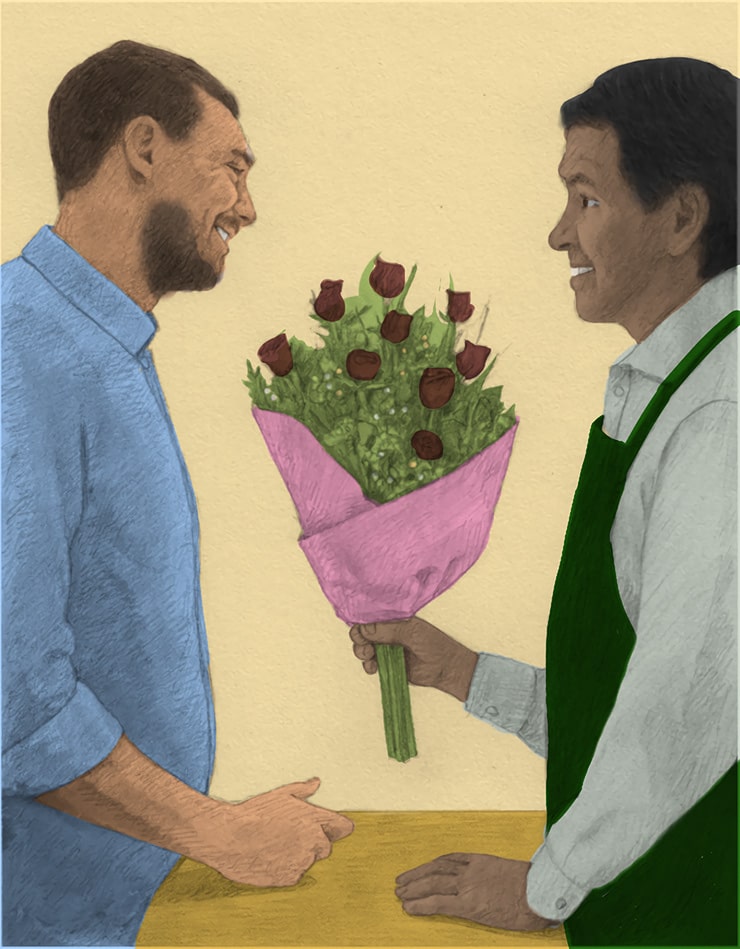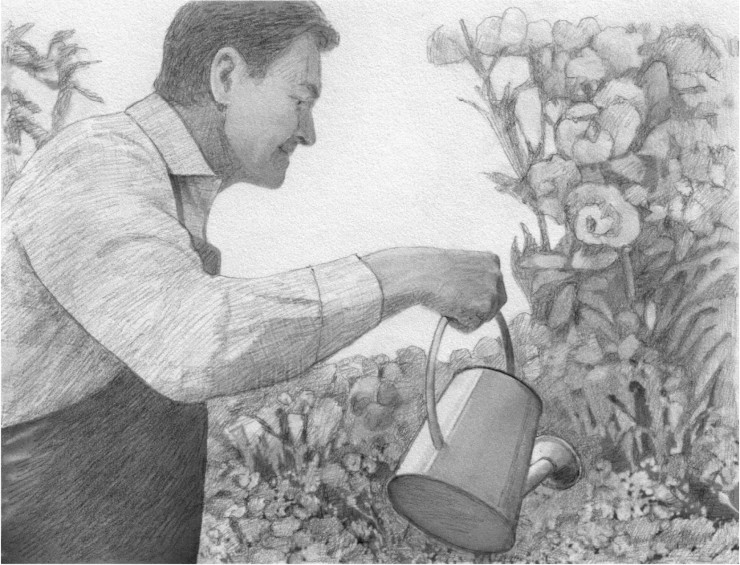Read by Michael Flamel
In 2018, I found myself working in a flower shop in up-state New York on Valentine’s Day. I opened at 7 a.m., and at 11 a.m. in walks the doctor who had delivered my son less than 30 hours ago. I knew he was coming, because I had scrawled his name on a piece of white tissue paper when he phoned in an order earlier in the day. A dozen red roses for his wife and two single roses as well. I extended to the doctor the tightly wrapped roses with baby’s breath, leather leaf, alstroemeria, and seeded eucalyptus.
“Hey, Dr. Doddard, how are you?”
“Oh, hey, you’re working here?” Of course, he didn’t remember my name.
“Yes sir, came here straight from the hospital this morning.”
“Ah, did you? Well okay,” he responded in a gentle South-African accent. “Had to for Valentine’s, I’m sure. I’m sure.”
“Yes sir. The machine never stops.”
“It really never does, does it?”
He went on with his day, as did I. My shift ended at five, and I returned to the hospital that night. My wife Ashley was recovering from an emergency Cesarean two days ago, and a balloon hovering over her head declared ‘It’s a Boy!’ Our son Roan slept nearby in a clear plastic tub. Two dish gardens sat on a table beside Ashley’s bed, gifts from well-wishing family members. The machine never stops, does it? No more days off, that’s one we started saying a while back. Certainly not now for us as new parents—and not for me working at a flower shop during Valentine’s Day!

Ashley landed this three-days-a-week florist job two months earlier. The owner, a longtime family friend, hired her knowing she was pregnant—and at first, he was mostly just doing us a favor. Because I had the free time, I offered to fill in for Ashley during her maternity leave. I’d keep her job on ice for her, as long as she needed. That way, as soon as she was ready, she could come back to work. Otherwise, he would have had to hire a real replacement. Kevin, the owner, liked the idea, and agreed to give it a go.
I ended up working there three months in total, covering three major holidays, through Roan being born and my first true-to-form north country Winter. Everyone else had been working at the flower shop for years.
I started in receiving—and found it amazing. I should have known, but people have formed entire business enterprises shipping plant matter: delicate, fragile, thirsty cargo such as boxes of 48 or more Liberty Red roses bound more tightly together than a first-cutting hay bale. I was told to cut open each box with a razor knife (with its long, chipped and rusted blade and cracked wooden grip), take out the bundles of 12, and cut the base of the stems quickly and at an angle to ensure that the roses get water. Cut them flat and they’d sit flush with the bottom of the bucket and couldn’t drink—and roses get thirsty.
Bunky (no lie, that was his name) trained me. His hair was bowl-cut, and he played guitar on the weekends in a band. During the week, he cuts flowers. He knows which ones get hungry and which ones are thirsty … or both. And Bunky knows the names of every delivery guy, the vendors, and the companies (he even knows them by the color of their boxes), all from memory.
Soon Kevin put me in the front end of the shop, which is very much like being in charge of the entrance and exit of a tunnel, with no responsibility for the goingson in between. Four floral designers worked in the “tunnel” (the basement)—Kevin the owner, Lisa, Marilyn, and Jenny. Within two weeks I was running, by myself, the front end of a well-established, more-than-a-decade-old floral enterprise owned by a local legend. Within three weeks, I had the keys and was opening the shop.
The shop was busy, and the work was hard. There were couple’s weddings and loved one’s funerals. Delivery orders taken by phone to churches I didn’t know on roads I’d never heard of. But I was always polite. I listened, asked questions, and learned. And I said, “Yes, ma’am” and “Yes, sir” every single time—even when most people would have said no.
The second major aspect of a flower shop, once you have a storefront full of plants, is providing delivery services. We’re talking restaurants and car dealerships, military bases and airports. You need clearance for some of this stuff. And it’s important, because you’re delivering someone’s heart and soul to somebody they love. They majorly care how that process plays out. One innocent accident, and we’re talking irreparable damage. Funerals especially. You’re walking someone through a process that florally represents their grief.
Before I started opening, Kevin would arrive at the shop around 7 a.m., feed Shadow, the store cat, flip on the lights, boot the computer system, and turn on the “OPEN” sign by 9 a.m. But the phone started ringing around 8:30 a.m. almost every day. A lot of church people buy flowers, and they keep church hours. Kevin would stay there until 7 or 8 at night sometimes, depending on the season. We’d get rashes of weddings. Brides with hands on their hips and elbows bent. Grooms fingering their phones and humming every so often. I don’t know how Kevin did it, seriously, shipping and designing and re-shipping the only product even more sensitive than glass. Cut flowers. Rose bowls. Baskets. Vase arrangements. Cakes. Casket sprays. What an unending production!
One night Ashley told me a story about how Kevin had gotten on her case for watering half the show-floor plants, stopping to help a customer, and not remembering where she’d stopped. She just went back and started all over. I made the mistake of explaining to Ashley Kevin’s point about how overwatering is as detrimental as not watering at all. I told her about my daily process for working through watering hundreds upon hundreds of plants in the shop. When I reached the end of my explanation, she simply said, “I thought we only watered once a week.”
“Water once a week maybe,” I replied, “but check daily. The way you keep from drowning your potted plants is to dip a finger into the soil no more than an inch in from the edge. If it feels dry on your fingertip, it’s time to water. Water the dish below if you can, or if you pour onto the soil, do it gently, not near the base of the plant. And don’t water the base of plants that grow foliage out radically from a single center, or mold can grow.”
I liked working for Kevin. He had gone out of his way to accommodate our personal lives when so many others wouldn’t have. I vacuumed every week without being asked. I wrote my own list of shop chores—and checked them off myself. I never talked to him about it. He just noticed one day how much cleaner everything was. Occasionally, I would find a highly missed, very needed object hidden behind a counter or buried in the back of a junk drawer. Store keys. A credit card. Bills. Unopened envelopes from the IRS. Retail is difficult.
Still, Kevin, like the rest of us, had his side hustle.
He was in the process of becoming a Methodist minister. He had a story. He had lost more than 200 pounds in the last five years, and he was only about 5-ft., 5-in., so that should tell you something. He had overcome adversity and struggles running his small, local business—and he’d held on to his dreams. Full of sermons, he’d say, finding lessons everywhere in everything. I said to him one day that running a florist and pastoring a church had a potentially beneficial overlap. He could essentially be a one stop shop for wedding and funeral services! If the person you’re paying to officiate is also locally known as one of the best floral and event designers, that’s what you call a two-for-one. Kevin enjoyed that thought.
But just around that time, my phone rang—with the call from the farm. Springtime meant the beginning of farm work, starting slowly and eventually becoming the insane avalanche of 80- to 90-hour work weeks of Summer. The hours began to conflict with my flower shop schedule. Ashley was feeling great, and she was willing to spend a little time away from the baby a few days a week. So I left the florist job, and she took it back.
I loved the plants. I loved that the one job that had me trapped indoors in a store all day was still a room filled with living, breathing, sunshine-eating things. But I, like them, was made to be outside. It was where I was supposed to be, and no matter how much time I spend away from the farm, I am bound to it like a twining vine. I was ready to sweat in the sun, stink like a barn, and knock my boots off at the doorstep again.
My time at Sherwood Florist (no lie, that is the name) tingled with providence and serendipity. My little son had just entered the world, and I had to look at myself as a father for the first time in the eyes of a helpless child. Handing a single rose stem to a young boy as he clumsily wrote the word “Love” on a little card against the counter—and the dozens of other times I helped people share love through plants every day—kept reminding me what’s truly important. My entire time at the flower shop felt like I was in a classroom, learning about flowers and people and life.
And, that Valentine’s Day, handing 14 roses to the man who had just the day before handed me my son for the first time? I never could have imagined it. That says it all. ❖



 Previous
Previous

